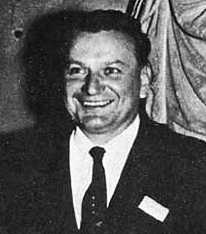Power Arnold Ehricke
Krafft Arnold Ehricke (born March 24, 1917 in Berlin ; † December 11, 1984 in La Jolla ) was a German-American rocket engineer.
His father, Arnold Ehricke, was a professor of dentistry and maxillofacial surgery. His mother, Ruth, was also a practicing dentist and lived in Boston after the divorce.
Ehricke graduated from the Technical University of Berlin in 1942 with a degree in aeronautical engineering . During the Second World War he was an important member of the rocket development program in Peenemünde . It was also here that he began work on future space projects, including manned spaceflight and nuclear rocket propulsion.

In 1947 he came to the USA as part of Operation Paperclip , where he continued his work on rockets and space travel. In the early 1950s he became an employee of the newly founded Consolidated Vultee Aircraft Corporation (later General Dynamics ) Astronautics Division. He was involved in the development of the successful Atlas rocket . In 1954, Krafft Ehricke received US citizenship. In 1959 he was appointed director of the Centaur program, where he led the development of the world's first rocket stage using liquid hydrogen and liquid oxygen as fuel.
From 1974 as chief scientist at the North American Rockwell Space Systems Division, he developed concepts for interplanetary and interstellar space travel and raw material extraction on the moon and Mars.
He died of leukemia in La Jolla in 1984. Some of its ashes were brought into space during the first space burial in 1997 . He was married to Ingeborg, with whom he had three daughters. His widow founded the Krafft A. Ehricke Institute for Space Development in 1985 .
Works (selection)
- Krafft A. Ehricke: Space Flight, Volume 1: Environment and Celestial Mechanics , Van Nostrand Reinhold (1962)
- Krafft A. Ehricke: Space Flight, Volume 2: Dynamics , Van Nostrand Reinhold (1962)
- Krafft A. Ehricke: Future Missions , New York Academy of Sciences (1965)
- Krafft A. Ehricke, Betty A. Miller: Exploring the planets , Little, Brown (1969)
Web links
- Photo by Krafft Ehrike and information in English
- Krafft Arnold Ehricke ( Memento of March 4, 2016 in the Internet Archive ), Biography of Technologies of the frontier
- Krafft Arnold Ehricke in the Encyclopedia Astronautica (English)
- Ehricke, Krafft in the Astrophysics Data System
- Krafft Arnold Ehricke in the online archive of the Austrian Media Library
swell
- ↑ About increasing the efficiency of the plantation process with the help of suitable fixation measures
- ↑ Eugene F. Lally: How Spaceflight was Born ( Memento of January 12, 2012 in the Internet Archive ) (PDF file; 137 kB)
- ↑ a b KRAFFT A. EHRICKE DIES AT 67; ROCKET PIONEER AND PHYSICIST nytimes.com, accessed March 7, 2014
- ^ Krafft A. Ehricke - Memorial Spaceflights. In: celestis.com. March 14, 2019, accessed on March 14, 2019 .
- ↑ Biography
| personal data | |
|---|---|
| SURNAME | Ehricke, Krafft Arnold |
| BRIEF DESCRIPTION | German-American space pioneer |
| DATE OF BIRTH | March 24, 1917 |
| PLACE OF BIRTH | Berlin |
| DATE OF DEATH | December 11, 1984 |
| Place of death | La Jolla |
